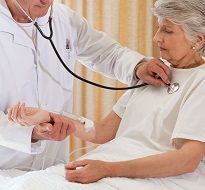Article
Many Women and Elderly Patients Receive Inadequate Treatment for AFib-Related Stroke Prevention
Author(s):
Study results show that women with atrial fibrillation are less likely to receive recommended thromboprophylaxis medications than men, and patients age 85 and older are often treated with aspirin as the sole antithrombotic agent.

A retrospective cohort study of primary care practices in an academic healthcare system finds that women are less likely than men and younger patients are less likely than older patients to receive appropriate oral anticoagulation for atrial fibrillation (AF).
Â
Investigators reviewed the records of 1,585 AF patients who visited physicians between March 2013 and February 2014. They then compared actual treatments to those recommended for each patient by a decision support tool that uses individually specific risk factors for stroke and hemorrhage to project quality –adjusted life expectancy.
Â
When the investigators divided the cohort by sex, they found a significant discrepancy in treatment quality. Actual treatment differed from the decision support tool’s recommendations for 45% (326) of the cohort’s 725 women and 39% (338) of the cohort’s 860 men (p = 0.02).
Â
When the investigators divided the cohort by age, they found a similar discrepancy. Actual treatment differed from the support tool’s recommendations for 43% (575) of the 1,328 patients who were less than 85 years old and 35% (89) of the 258 patients aged 85 years or older (p = 0.01). That same analysis also uncovered many undertreated seniors, who were receiving aspirin as their sole antithrombotic agent.
Â
“Physicians should understand that female sex is a significant risk factor for AF-related stroke and incorporate this into decision-making about thromboprophylaxis,†the study authors wrote in the Journal of the American Geriatrics Society. “Treating older adults with aspirin instead of oral anticoagulant therapy exposes them to significant risk of bleeding with little to no reduction in AF-related stroke risk.â€
Â
Â
Current guidelines from the American Heart Association, American College of Cardiology and Heart Rhythm Society urge physicians to prescribe oral anticoagulation to all AF patients with CHA2DS2-VASc scores of 2 or more. The treatment guideline assigns patients 1 point each for hypertension, diabetes, a history of vascular disease, a history of congestive heart failure, being aged 65 to 74 years and being female. It assigns patients 2 points each for being 75 years old or older and for having a history of stroke, transient ischemic attack or thromboembolism.
Â
By that guideline, all cohort patients aged 85 years and older should have received oral anticoagulation, even if they had no other risk factors. Women with AF should also receive anticoagulation in many cases that similarly healthy men should not. (Indeed, an analysis of current treatment recommendations that was published in JAMA Internal Medicine found that 97.7% of all women with AF would earn at least 1 more point on the CHA2DS2-VASc scale and thus qualify for oral anticoagulation. The same analysis calculated that less than 90% of all men with AF would score 2 or more.)
Â
“Doctors need to realize we have mental biases that women are healthier and at lower risk of stroke. It’s the same story for coronary artery disease and risk of heart attacks. We think women are at lower risk and we ignore warning signs,†said the study’s lead author Mark Eckman, MD, Posey Professor of Clinical Medicine at the University of Cincinnati’s College of Medicine. “The irony is that women have a higher risk of AF-related stroke, controlling for other risk factors such as hypertension, diabetes, congestive heart failure, yet women are being under treated.â€
Â
Â
2 Commerce Drive
Cranbury, NJ 08512
All rights reserved.





